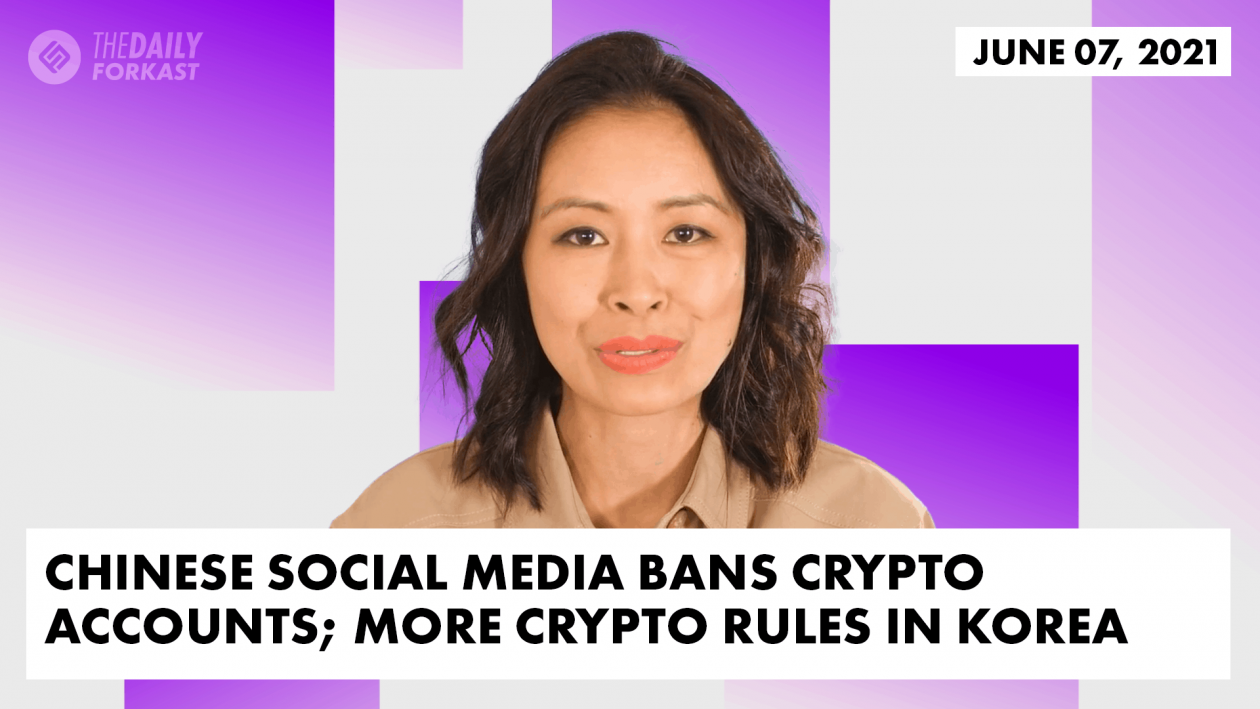Dozens of Weibo crypto accounts banned over flouting platform guidelines, laws.
Executives, employees of South Korean crypto exchanges barred from trading on their platforms.
Chinese chipmaker launches chip that supports ETC, ETH mining.
We’ll have more on that story — and other news shaping the cryptocurrency and blockchain world — in this episode of The Daily Forkast, June 7.
Transcript
Welcome to The Daily Forkast, June 7th, 2021. I’m Angie Lau, Editor-in-Chief of Forkast.News. Let’s get you up to speed. From Asia to the world.
The China crypto crackdown continues — over the weekend, dozens of crypto accounts on the social media platform Weibo were banned. These targeted users being told that they’ve been in violation of the platform’s guidelines and laws when they attempted to log in. The accounts featured market analysis and even promoted crypto projects. 17 of the affected users have since reopened accounts under new names. One of them even posted this reaction to what had happened, saying, “The account that I’ve been using in the past few years was suddenly banned. But I have come to terms with it because the day was going to come sooner or later. But this is not the end of the freedom that DeFi symbolizes.”
If you look at the guys that they actually took down, there are about 25 in total and some of them have very large followings. They are probably trading it themselves, yes, but these are guys that have a blog that people can follow and that’s the key thing. They are trying to take away the source of information to make it more risky for people to trade crypto.”
The heavy hand of government also being felt in South Korea where authorities have introduced more amendments to regulations governing cryptocurrency trading in the country. Now executives and employees of crypto exchanges will be banned from trading on their own platforms. Violators could possibly be looking at a penalty of nearly US$90,000. They could also lose their business licenses.
Now, according to local media, some exchanges aren’t too happy with these changes. They’ve argued that the ban will restrict the cash flow needed to run these platforms and that it will render their income through commission illegal.
Well, it’s not all doom and gloom for crypto exchanges in Asia. London-based exchange. Luno is looking to break into the Indonesian space. Now Luno is owned by the Digital Currency Group and is reportedly in early talks with homegrown conglomerate Lippo Group about launching a joint venture in the country.
The cap requirement for it will just be under US$10 million, which the two sides intend on splitting equally.
And taking a quick look at the end of the trading day here in Asia, Bitcoin prices finishing in the red, down a tenth of a percent by 4:00 pm local Hong Kong time.
And in the top 10 for cryptocurrencies, with the exception of Bitcoin, it’s green all the way down to 10. Ethereum being the biggest performer, closing the day up 2.7%.
Now shifting focus to Australia now with the country’s first capital growth fund aimed at exposing wholesale investors to Bitcoin has garnered quite a bit of inquiry, including from a superannuation fund, as well as some of Australia’s biggest wealth groups. That’s according to Monochrome Asset Management founder Jeff Yew, who told local media that he hopes to lead the charge on Australia’s adoption of Crypto, and that includes helping the country set up its first Bitcoin ETF. Yew believes Australia’s inertia when it comes to institutional investment in Crypto stems from a shortage in regulatory mechanisms.
And finally, despite crackdowns, there’s still business to be done in China. China-based chip maker Sunlune Co. Ltd has unveiled a new chip that supports mining on both Ethereum and Ethereum Classic. According to the company, the JasminerX4 is the world’s first high throughput chip with integrated storage and computing. The launch obviously comes during turbulent times for industries in need of chips, particularly the automobile and consumer electronics sectors. And to add to their woes, the shortage won’t end any time soon. According to Singaporean logistics solutions company Flex, it could last well into 2022.
And that’s The Daily Forkast from our vantage point right here in Asia. For more, visit Forkast.News. I’m Editor-in-Chief Angie Lau. Until the next time.

